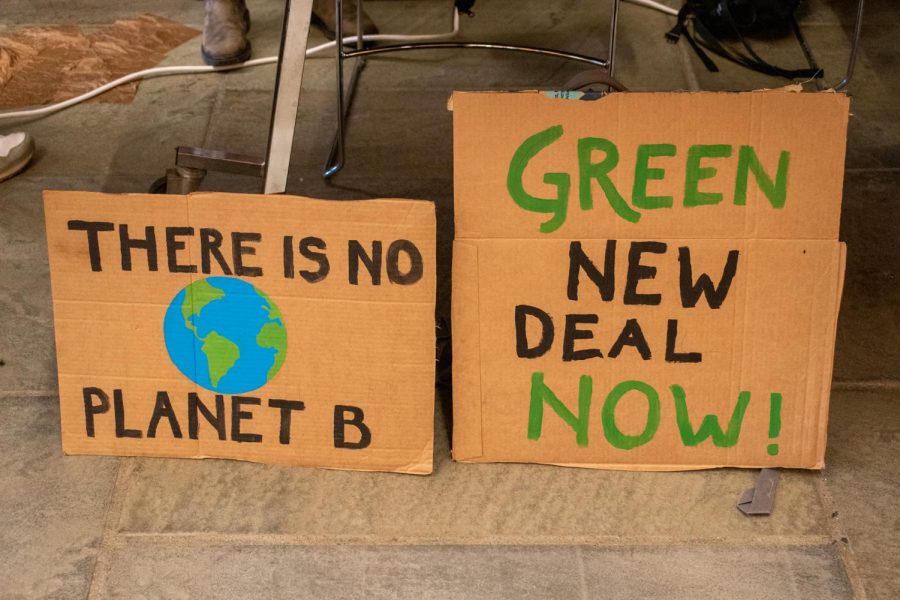With the Democratic primaries on the horizon, climate change has become a major issue amongst the candidates. Polls say that voters consider climate change to be increasingly important. In the Democratic caucuses in Iowa, for instance, climate change ranked second to health care as the most crucial issue in the upcoming vote.
While scientific evidence has proven climate change to be a real and significant issue, there remains considerable disagreement over how to best confront it. Moreover, since the greatest severity of its impact will likely be felt by future generations, the threat doesn’t feel as imminent today. As Saturday Night Live comedian Michael Che observed, “I think it’s because they keep telling us we’re going to lose everything and nobody cares about everything. People only care about some things. Like if Fox news reported that in 2030 climate change is going to take away all flags and Confederate statues, there would be recycling bins outside of every Cracker Barrel and Dick’s Sporting Goods.”
While individual initiatives like recycling and reducing ones carbon footprint help absolve us of some of the guilt, if we want to think long-term, we must realize that this problem goes far beyond the individual. According to a 2017 Carbon Majors Report, over half of global industrial emissions since 1988 can be traced to just 25 corporate and state producing entities. Similarly, Emma Marris argues in the New York Times that, “Yes, our daily lives are undoubtedly contributing to climate change. But that’s because the rich and powerful have constructed systems that make it nearly impossible to live lightly on the earth. Our economic systems require most adults to work, and many of us must commute to work in or to cities intentionally designed to favor the automobile.”
Such a broad, systemic issue requires collective action that goes beyond the individual, and it is race, a social construct with profound material implications, that acts as that wedge which divides and conquers. As author Ian Haney López explains, “Responding to the climate crisis requires collective action on a massive scale, and the most potent political impediment to collective action comes from racial division, often intentionally stoked by right-wing plutocrats. That’s why mobilizing Americans on climate-change policy also requires countering racial division and seeking economic benefits that are broadly shared.”
Incorporating antiracism into climate change might appear to create a wildly complex problem – one that even threatens to undermine the solidarity of the existing movement. However, fragmenting issues that are extremely interrelated only sacrifices long-term, systemic gains in exchange for immediate, surface-level wins. The term environmental racism captures how racist policies harm the environment and how the gross exploitation of natural resources reproduces racial inequities.
In the long-term, division along racial lines weakens social movements, making them susceptible to internal collapse as well as external manipulation. Granted, when inter-connecting formerly disparate social causes, there is a risk of disagreement, as highlighted by Clara Goldberg in her piece for the Daily Collegian. Contrary to Goldberg’s position, incorporating a truly intersectional analysis only makes these movements stronger in the long-term. It is those most impacted by injustice, who by the very nature of their lived experience, should be deciding whether or not a movement is truly intersectional, not those whose power and privilege protect them from the severest of harm.
Movements for social change are more impactful when people of all races join forces. This is because they inherently get to the root of shared injustices.When Martin Luther King shifted his activism from protesting indecency against black Americans to a multiracial Poor Peoples’ Campaign in 1968, he became significantly more dangerous by taking a systemic approach to injustice that centered shared harm across racial lines.
Another reason to think about climate justice from an antiracist framework is that those most impacted by racism, including communities of color in the global south and Indigenous communities, are also those who are the most impacted by climate change. The recent wildfires in Australia harmed Australia’s First Peoples the most, despite them having practiced sustainable land management strategies, such as traditional burning techniques, that date back thousands of years.
Environmental activist Greta Thunberg understands the importance of having a multiracial coalition, and has used her platform to amplify the voices of young black and indigenous climate activists of color such as Ridhima Pandey, Kaluki Paul Mutuku, Aditya Mukarji and Nina Gualinga. By doing so, she is building on legacies of resistance against environmental racism that long predate her, and counteracting a media that is “trained to privilege and prioritize particular voices,” says Julian Brave Noisecat of the think tank Data for Progress.
As sociologist and writer Nikki Blak explains, “We’re facing extinction as a species. We’d better learn quick how to center the voices of the people who have faced extinction before and figured out how to survive.” Racism is not peripheral to climate change because race was created to justify an economic system that purposely exploited the natural resources of the planet, the collective, centuries-long effects of which we are seeing today. We can either listen to and follow the direction of those who have the most experience surviving indescribable harm while staying hopeful, or let the tried-and-true divide and conquer mechanisms take us all down.
Jennie Moss is a Collegian contributor and can be reached at [email protected].




















joeyd • Feb 19, 2020 at 6:47 pm
Racism,capitalism and mother nature are the greatest threats to our world. We need to work together guys to save the world!